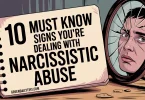Relationships are hard to manage, particularly when you are living with a narcissist. A healthy relationship, in which respect and communication exist, is essential as opposed to a relationship with a narcissist, where power and manipulation dominate. Some of the actions common in a healthy relationship are regarded by a narcissist as desperation signals, thereby providing them with a sense of control. Here are 10 things that shout desperation to a narcissist and why you should not do them.
1. Always Answering Their Calls
In a healthy relationship, answering your partner’s calls shows respect and care. However, to a narcissist, being constantly available signals that you have no other priorities. They interpret this as desperation, assuming they have you “hooked.” To avoid this, maintain boundaries and don’t always pick up immediately, show you have a life outside of them.
2. Staying on the Phone for Hours
During the love-bombing phase, narcissists may keep you on the phone for hours to build a false sense of connection. While this might feel exciting, it signals to them that you’re overly invested. Once they’ve secured your attention, they may suddenly reduce contact, leaving you confused. Limit long calls to avoid appearing overly available.
3. Asking How They Feel About You
Insecurity can lead you to ask a narcissist, “Do you love me?” or “What do you think of me?” In a normal relationship, such questions might prompt reassurance, but to a narcissist, they scream insecurity and desperation. This gives them power, as they know you’re seeking their validation. Instead, trust that genuine affection will be shown without you needing to ask.
Related Topics:
13 definite Signs That Your Childhood Was Extremely Damaging
7 Demonic Doors Opened in YOUR Life Through Narcissists
4. Being Always Available to Meet
If you’re always ready to drop everything for a narcissist, even when they cancel plans repeatedly, they’ll see you as desperate. Your willingness to accommodate their schedule, despite their unreliability, signals that they have control. Set boundaries and don’t always agree to last-minute plans; show that your time is valuable.
5. Repeatedly Professing Your Love
Telling a narcissist “I love you” excessively makes them feel superior, as if they’re the center of your world. While genuine affection is normal, to a narcissist, it’s a sign of weakness and desperation. Be cautious about over-expressing love, especially early in the relationship, to avoid giving them leverage.
6. Not Questioning Boundary Violations
When a narcissist crosses your boundaries, such as ghosting you or staying out all night, and you don’t address it, they assume they can do whatever they want. This lack of accountability signals desperation, as it suggests you’ll tolerate mistreatment. Enforce consequences, like distancing yourself, to show self-respect.
7. Accepting Lack of Consequences
Setting boundaries without enforcing consequences is ineffective with narcissists. If you warn them about unacceptable behavior but continue the relationship without action, they’ll see you as weak. For example, if they ghost you and you don’t walk away, they know they can manipulate you. Always follow through with consequences to maintain your power.
8. Chasing Resolution During Silent Treatment
The silent treatment is a common narcissistic tactic to exert control. If you beg to “talk it out” or resolve the conflict, you signal desperation and weakness. Instead, embrace the silence, focus on your own life, and show them their tactics won’t break you. This demonstrates strength and independence.
9. Sharing Your Insecurities
Being vulnerable and sharing personal insecurities is healthy in normal relationships, but with a narcissist, it’s a mistake. They view vulnerability as weakness and may use your confessions against you later, especially during conflicts or breakups. Protect your personal stories and insecurities to avoid giving them ammunition.
10. Seeking Their Validation on Your Appearance
Asking a narcissist, “How do I look?” invites criticism or backhanded compliments designed to undermine your confidence. Covert narcissists might respond vaguely, like, “If you think you look good, then you do,” to plant doubt. Avoid seeking their approval, validate yourself, and own your confidence.
These behaviors might feel natural in a healthy relationship, where openness and availability foster connection. However, with a narcissist, they’re interpreted as signs of desperation, handing them the power to manipulate you. Recognizing these red flags early can help you protect yourself.
If you suspect you’re dealing with a narcissist, consider distancing yourself or cutting contact entirely. Focus on building your self-worth and maintaining boundaries to avoid falling into their trap.







Leave a Comment